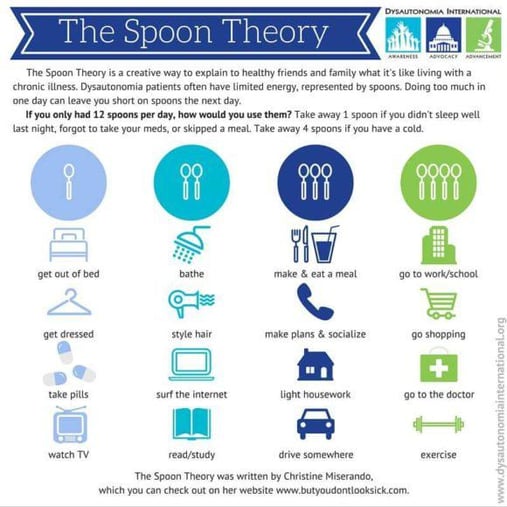Have fatigue? The Spoon Theory could help
Do you ever feel that event the smallest social outings leave you feeling completely drained?
Have you found that undertaking seemingly easy tasks like taking a shower now require a huge amount of effort?
For the seemingly healthy person, they will not have to think twice about the amount of effort required to do seemingly simple tasks such as morning showering or talking to friends. However, for many patients with chronic illness, these are daily struggles.
Fatigue experienced on a daily level is a common feature of many rheumatic and chronic conditions. Despite the individual often being highly motivated and mentally ready to perform a task, an overwhelming body fatigue can restrict those thoughts from becoming actions. Understandably this fatigue can quickly affect other areas of their life (ability to commit to work, social interactions, as well as affecting moods and emotions)
For individuals who do not suffer from chronic fatigue, it can be hard to comprehend. The individual may look perfectly healthy on the outside, yet are unable to do what would appear a simple and easy task. Sure everyone feels tired someday, like when you have finished a very busy day at work, but for people with chronic fatigue, they can experience this level of fatigue with just driving to the shops. If they were to just keep pushing through the fatigue it would lead to compete burnout and take longer and longer to replenish those energy stores.
So what is spoon theory?
Spoon theory was a concept coined by a women suffering from lupus, and used as a way to help her take control of her fatigue as well as provide perspective to her friends and family. Spoon theory, uses spoons, as a visual representation of how much energy someone has throughout their day. For the average healthy person, they would have a seemingly unlimited amount of spoons per day, whilst a person with chronic fatigue would start each day with a limited number of spoons.
Every activity during the day will cost a person a certain amount of spoons, the greater the effort the more spoons required. Once all the spoons are used up for that day, that’s its, all their energy is used up and the only way to replenish those spoons is through sufficient sleep and rest. If they push past their number of spoons, then a crash will often occur, which will often take days to feel back to baseline.
Let’s say a patient has 10 spoons that represent their entire energy for the day. Activities such as showering, eating, and getting dressed may take up one spoon each. Whilst doing a 30 minute walk may take up 3 spoons. The more activities in the day, the faster they will use up their spoons.
Now not everyday will a person wake with 10 spoons. Let’s say they had restless sleep (-1 spoon) or woke up in some pain (-1 spoon) they may already begin the day with 8 spoons before they have even left the bed. As there is no way to increase the number of spoons for the day, the person uses spoons to determine which and how many activities can be done for that day. By using spoons as a visual metaphor you can give weighting to daily tasks in order to enable them to perform as much, but not burnout, for that day. This may mean eliminating certain activities that are likely to push them over the limit.
The following is a great infographic helping to visualise spoon theory:

https://familyandchildtherapy.com/wp-content/uploads/2019/11/Spoon-theory-580x580.jpg
So how can spoon theory help you?
Firstly, spoon theory allows for more effective pacing in daily life, not just for physical activity. By being able to give weighting to specific tasks you want to complete, we are hopeful that in time we can avoid frequent burnouts. Spoon theory can help give you more control and allow for you to do the things you want to but in a more spread out and energy effective manner. It can allow people to become more creative in ways to reduce daily fatigue. You may find that sitting down whilst cooking or in the shower may take the task form 1 spoon to ½ spoon. On days when you are running low on spoons, then you may get food delivered as opposed to walking to the shops or vice versa on days with more spoons then doing a little bit more exercise.
The second main benefit of spoon theory is to help friends and family understand your energy levels for that day, and how fatigue impacts your life. I have many patients who worry about being perceived as ‘flaky’ when they have to cancel from meeting up with friends. Even though they really want to, doing so could push them over the edge of fatigue. By explaining to friends and family they can understand how your body responds to certain tasks and what you are physically capable for that day.
If you suffer from fatigue symptoms, then try giving spoon theory a go. You may find that being able to quantify and allocate energy can help improve your daily life and avoid the regular boom and bust cycle of energy you currently experience.

.png?width=940&height=492&name=BJC%20Facebook%20Post%20(31).png)
.png?width=600&name=BJC%20Facebook%20Post%20(31).png)
